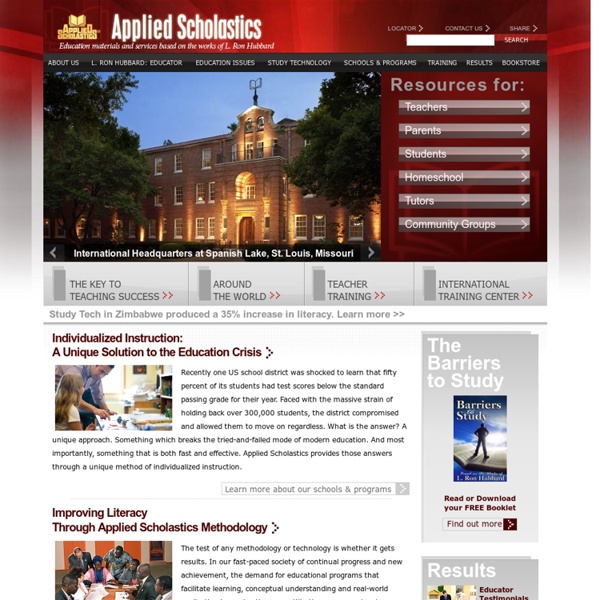



The Courseroom The Supervisor’s Code Just as auditors must follow a code of conduct, so too do Supervisors in a Scientology course room. Unlike teachers in many traditional classrooms, Course Supervisors do not act or behave as an “authority” telling students what to think, nor do they espouse opinions on the subject. Instead, students are guided to find the answers for themselves in Dianetics and Scientology materials. In the following code, written by L. Ron Hubbard in 1967, the key guidelines are set forth that ensure the course room is standard and professional, with maximum benefit to the student. 1. 2. 3. 4. 5. 6. 7. 8. 9. 10. 11. 12. 13. 14. 15. 16. 17. 18. 19. 20. 21.
World Institute of Scientology Enterprises There are 26 Hubbard management courses you can deliver in your business with WISE membership. Anyone in your workforce, regardless of prior familiarity with the Hubbard management system, can quickly grasp the materials on these courses and become a trained and fully effective manager or employee Study Technology Historically, the first step of study has always been overlooked — learning how to study. The ability to quickly assimilate information, retain it and then apply it makes or breaks any learning endeavor. While training hundreds of students, and examining the basics of study itself, discovered three universal barriers to study, barriers which block understanding and prevent application. These techniques, and full body of knowledge about learning, make up what is called Study Technology and it can be studied on-site in your company classroom. The Basics of Administration The next stage is training on the basics of Hubbard management technology. Establishing an In-House Course Room
WISE - Course Room Set-up Kit Our training courses don’t exist to train you or your employees in your profession or technical field. That’s not our purpose. Our materials don’t cover how to perform open-heart surgery or how to repair a car; we assume you know your profession. Instead, our courses train you in the principles of the Hubbard management system and give you the knowledge and skill to create and successfully manage a business or career. After years of training in your profession, it’s only right that you succeed in your career. An entire team trained on LRH’s administrative works puts everyone on the same page: each person knows what others should be doing and what’s expected from them - any unnecessary and unproductive activities within a company are replaced by actual production. Thus we come to the key benefit of WISE membership - in-house training. Company Trainer The Economics of In-House Training In-House training is popular for two reasons: a) it is effective, and b) it is economical. The costs are:
Independent Checksheets We have set up, by necessity, an Independent Scientology course room, not affiliated with DM's because we want to practice Scientology and due to DM's 'Unclean Hands' (a doctrine in equity) we have been compelled to do so. We can't get Standard Scientology from DM's church anymore, because it isn't there and because he prevents us from getting it. So, here we are, with a First Amendment right, to practice our chosen religion, as guaranteed by that First Amendment and also put forth by L. These Independent Checksheets (IC) were compiled by Dan Koon, Class VI Auditor who worked with LRH in Ron's Technical Research and Compilations (RTRC) based on LRH's 1978/1987 Checksheets on which tens of thousands of standard auditors were successfully trained. More to come!
Education Automation (1962) Education Automation, Freeing the Scholar to Return to His Studies Foreword by CHARLES D. TENNEY SOUTHERN ILLINOIS UNIVERSITY PRESS, CARBONDALE AND EDWARDSVILLE FEFFER & SIMONS, INC., LONDON AND AMSTERDAM Copyright 1962 ISBN 0-8093-0137-7 Library of Congress Catalog Card Number 62 - 17620 My feeling about today’s meeting with you is first, that it is a tremendous privilege as a human being to stand with other human beings who are concerned fundamentally and deeply, as you are, with the process and further implementation of education and to be allowed to disclose to you what I think I have discovered regarding education’s trending evolutionary needs. I am quite confident that the Southern Illinois University’s new Edwardsville Campus studies are uniquely important. Out of college, I went to work and worked hard. But I did get an education in due and slow course‹but an education largely of my own inquiring, experimenting, and self-disciplining. My experience is now world-around.
World Game Series - Document One: The World Game: Integrative Resource Utilization Planning Tool (1971) | The Buckminster Fuller Institute Publications World Game Series - Document One: The World Game: Integrative Resource Utilization Planning Tool (1971) Publication Type: Other Image Publication Tags: World Design Science Decade Full Date Friday, 1 January 1971 Related File world_game_series_document1.pdf Author (if not Bucky) R. Images:
Paideia Proposal - Wikipedia The Paideia Proposal is a K–12 educational reform plan proposed by Mortimer Adler. Adler was a prolific author, and references to the Paideia plan for educational reform can be found in a number of his books listed in the references below. The proposal[edit] The Paideia Proposal is a system of liberal education intended for all children, including those who will never attend a university. As the Paidea Proposal developed, the original Paideia Group gave way to a National Center for the Paideia Program.[1] That organization, which eventually became the National Paideia Center, formulated a Declaration of Principles. Adler stressed that the proposal is much more than just a return to the basic skills of reading, writing and arithmetic. He proposed a curriculum framework within which each state or school district could pluralistically vary constituent areas of study. Teaching and learning styles[edit] See also[edit] Philosophy of education Notes[edit] References[edit] Adler, Mortimer J. (1982).
Charles Leadbeater: Education innovation in the slums | TED Talk Subtitles and Transcript | TED School in the Cloud